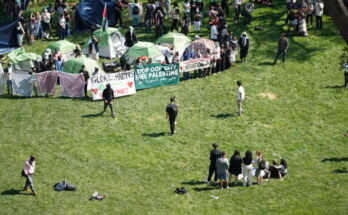 A new slate of “young” reform-minded professors elbows its way to the top by The Campus Staff, photo by Louis Oprisa
A new slate of “young” reform-minded professors elbows its way to the top by The Campus Staff, photo by Louis Oprisa
Faculty senate meetings are usually a good time to catch a nap. But not yesterday. In a dramatic turn of events, a renegade group of professors changed the leadership of the faculty’s main governing body. After the dust settled, only one member of the “old guard” remained standing.
In Shepard Hall 250 yesterday, standing-room only and overflowing with faculty and some students, the senate voted out all but one of its executive committee. The group was replaced with a bloc of professors who called themselves young (if you consider 40 young!) and reform-minded. The election followed more than a week of behind-the-scenes campaigning and heated email exchanges. The new “upstarts:”
- Marta Gutman, associate professor of architecture
- Ellen Handy, associate professor of art
- David Jeruzalmi, chemistry professor
- Fred Moshary, electrical engineering professor
- Renata Miller, associate professor of English
- Nancy Sohler, associate medical professor at Sophie Davis
One member of the reform bloc, political science prof Rajan Menon, was out of town for the voting and did not make it onto the executive committee. Charles Watkins, a champion of diversity at CCNY and a mechanical engineering professor, managed to hold onto his seat. Watkins, the only African-American among the new executive members, pointed to the diminishing number of black students at City when explaining why he should remain in position.
During the remarks of the other candidates, several criticized the idea of voting for a bloc of candidates, rather than focusing on the merits of individual professors. One warned against the dangerous problem of “group think” and another scolded that it was wrong to “just vote in your friends.” But in the end, group-think triumphed.
Professor Jeruzalmi, the top vote getter, thanked the outgoing committee, led by Rishi S. Raj, a professor of mechanical engineering. In their campaign platform, the reformists promised to “revitalize faculty governance at CCNY,” “end the practice of undisclosed payments to Senate leadership” and “be far more effective in representing the voice of the faculty.”
One reform that should happen ASAP: changing the outdated way the faculty senate conducts its elections. With several computer science professors in the room, Provost Maurizio Trevisan scribbled the candidates’ names on a marker board with a pen that was barely working. And then he painstakingly counted paper ballots one by one.



